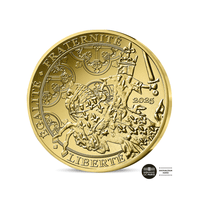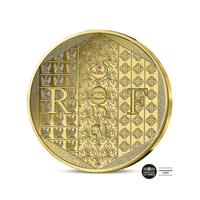Obverse
Reinterpretation of the Horse Horse Historical, this iconic currency takes up the features of the Gold cut issued in December 1366 for King John II dit "Le Bon". Presenting the monarch on horseback in charge in combat, this currency was struck to celebrate the liberation of the sovereign who was captured by the English during the Hundred Years War, hence his name "frank" which means "free". The quadrilobes initially present on the reverse of the historical currency are found here modernized alongside the sovereign. Accompanied by vegetated cross, these decorative elements are evocative of the nascent Gothic style.
Reverse
The reverse of this new collection honors the three temporal eras to which the three inspirations of this trilogy belong. Finding into a hexagon, these three graphic friezes interpret the French flag in its heraldic form. The facial value, the acronym RF as well as the warranty punches complete the composition of this reverse.
Obverse
Reinterpretation of the Horse Horse Historical, this iconic currency takes up the features of the Gold cut issued in December 1366 for King John II dit "Le Bon". Presenting the monarch on horseback in charge in combat, this currency was struck to celebrate the liberation of the sovereign who was captured by the English during the Hundred Years War, hence his name "frank" which means "free". The quadrilobes initially present on the reverse of the historical currency are found here modernized alongside the sovereign. Accompanied by vegetated cross, these decorative elements are evocative of the nascent Gothic style.
Reverse
The reverse of this new collection honors the three temporal eras to which the three inspirations of this trilogy belong. Finding into a hexagon, these three



